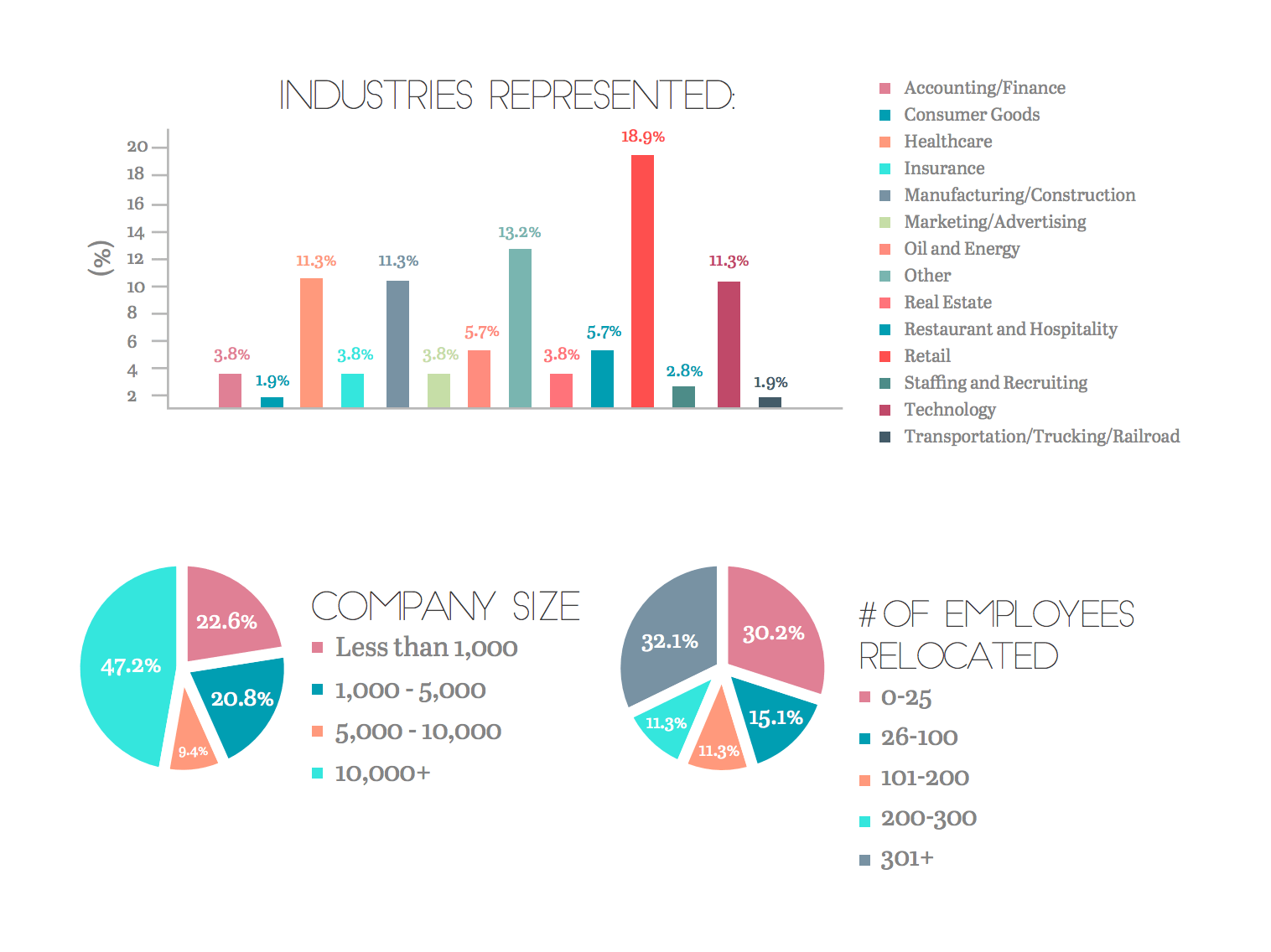Planning and implementing a successful team relocation
Globalization and the war for talent remain the key trends in HR for the last 10 years resulting in the increase of global mobility programs, according to the Annual Relocation Survey.
According to The State of Employee Relocation Report, across all industries, the number of companies taking advantage of global mobility programs is on the rise.

There are several common reasons that cause companies to rethink their approach to talent management:
1. Lack of candidates with relevant professional experience in the local market. Companies strive to ensure that the right people with the necessary skills are in the right places. If an employee has proved to be a good manager in his local office, the company can involve him in solving problems in other offices.
In some cases, there is a need to attract a specialist with unique experience who is hard to recruit in local market. For example, a specialist who is familiar with specific production technologies. In this instance, relocation of an employee from an external HR market is needed.
2. The need to offer exciting career opportunities and retain the best talent, who have achieved a certain career level in the company and have a proven track record of achievements in the region or country. Relocation, in this case, is an additional motivation tool.
3. The need to develop leaders with international experience. Companies can provide their prospective employees with the opportunity to live and work in another country so that they can expand their knowledge and perspective and build a global network of contacts.
5. Company expansion efforts and growth. With a regional, national or international expansion of the company, the need for talent is increasing, and often employees can be offered positions in the new branches on special conditions that should motivate them to relocate.
Some of the most common talent mobility strategies are:
-
- Short-duration programs, usually from a few months to a year, allow employees to share knowledge and experience across different locations and branches.
-
- Project-based assignments, where employees relocate temporarily or travel frequently to work on a specific project.
-
- Rotational programs that are aimed at the professional development of high-potential employees.
-
- Virtual mobility allows bringing employees from various locations to collaborate together virtually.
Pros and cons of relocation
One of the main advantages of the global mobility programs is the most effective use of knowledge (1) and the potential of highly qualified personnel in demanded areas. Another advantage comes with relocating younger workers as an opportunity to train future leaders (2) and expand the organization’s talent pool.
In the case of relocation of an employee from an external HR market, the advantage is an international experience (3), acquired by an employee earlier as well as new approaches, practices, methods (4) which he can bring to the company.
Speaking about the disadvantages, there are a few key issues that company leaders should keep in mind when managing relocation. First, relocation programs are always very cost-intensive (1). There are numerous costs that employers are responsible for covering, from traveling expenses to legal support to various employee incentives and relocation benefits. In some cases, an employee might also expect to receive a pay raise, additional paid leave, ongoing relocation assistance. Companies face an especially serious challenge when transferring employees from lower-cost to higher-cost locations.
The second challenge is associated with numerous legal issues (2), such as contracts, visas, taxation policies. As a rule, companies take care of that by offering to new employees an expert advisor to help them navigate all of the different challenges.
Where to start when relocating employees? A step-by-step guide
Relocation is a complex process that requires effective relocation practices and policies as well as competitive relocation packages. The employee relocation policy is vitally important to recruiting and the company’s talent management program and should be designed in alignment with the long-term business growth and hiring goals.
A comprehensive relocation program may differ based on the company’s budget, resources, and business goals, but it should include the following features.
1. Writing a relocation agreement. Ensure that the contract of employment contains a mobility clause and sets all the details of the employer’s relocation policy.

2. Creating a relocation offer. A consistent relocation offer package must include important terms such as contract duration, what relocation expenses will be covered by the company, the resources, and support that will be provided, the distance the employee has to travel to the new location, the time needed for the relocation. It is important that the offer takes into account the individual circumstances and needs of the employees, such as their family status.
3. Offering a relocation package. A potential way for the company to incentivize employees for relocation is to consider offering relocation packages and compensations. Compensation can take the form of a one-off payment to covering extra travel costs or covering all moving costs.
There is no magic formula when it comes to relocation packages, but it should cover the minimum set of elements and expenses associated with moving, such as reimbursement for expenses for house-searching, temporary living expenses, and transportation of household goods.
4. Arranging housing. Housing is a crucial aspect of the relocation process, it is important to ensure the employee has support in finding convenient temporary and long-term housing in the new location. The housing details are often discussed with each employee personally and included in the relocation package.
5. Offering cultural resources. An employer should simplify the process of cultural adaptation and help the employee deal with the new country’s nuances. Offering language lessons, providing a mentor in the new office location, helping identify the best school system for the employee’s children are some of the actions to mention.
What should be included in a relocation package?
A relocation package is aimed to provide employees with the strongest start for their new position in a new city. In some cases, the company chooses to pay for the full expense of moving, while in other cases provides a flat dollar amount to cover the expenses. Each company typically creates its own relocation package based both on its established policies and individual agreements with an employee.
Typically a relocation package should include some or all of the following:
-
- Home finding. The costs associated with finding, buying, or renting a new home are commonly included in relocation packages.
-
- Transportation reimbursement. The company usually reimburse all travel expenses associated with moving to a new location, including flight or train tickets, taxi, etc.
-
- Temporary housing. The cost of a hotel or temporary housing for a certain period of time is often provided.
-
- Job search assistance for an employee’s spouse or partner.
-
- Other moving costs. The costs of a moving truck, packing and unpacking services, and other related expenses may be included in the package.
In-house vs. outsourced relocation
There are two common approaches to relocation management. The first approach implies that all the processes are administered by the HR department within the company, that allows controlling all the process from beginning to end. But it is important to note that global relocation involves many logistical, tax, and legal considerations that sometimes outside expertise is required.
The second option is to outsource the relocation administration to a relocation company. Today, there are a number of full-service Relocation Management Company (RMC) that will help to manage the entire relocation process.
Some of the benefits of outsourcing global relocation include:
-
- One of the key factors to partner with an RMC is access to their specialized expertise and knowledge of relocation tax and legal requirements. Since immigration laws and taxation policies are incredibly complex and vary from country to country, it’s important to handle it as correctly as possible.
-
- An RMC partner has an access to the current industry best practices and can advise and review your company’s relocation policy based on the budget, talent acquisition needs, and company culture.
-
- RMC often has a network of qualified service partners, such as real estate agents and global destination service providers, and helps to handle all vendor management processes. RMCs are also often responsible for handling various service issues, claims and disputes, ensuring the overall good experience for the employee.
If your company is ready to outsource all or some of the aspects of mobility management, there are various types of services and providers to partner with – from relocation agencies that manage all relocation processes to attorneys who facilitate visas and work permits to consultants who continually monitor all the logistics and costs.

Sounds too complicated? Set up an offshore team
There is another alternative that is used by many global companies like Google, eBay, Microsoft, Buzzfeed, Intel, and more. Working with a dedicated offshore development team guarantees that all your tasks and processes are under control while all the costs are optimized.
One of the easiest ways to do it is to partner with two-sided platforms like YouTeam, which serves as a one-stop-shop for setting up and managing your offshore development center.
144 FULL STACK DEVELOPERS IN 82 AGENCIES
It’s extremely important that all payroll, office space, vacations, legal, training, and all other management are handled by the firm, allowing you to focus on your company’s main goals.
[social_warfare buttons=”Facebook,Twitter,Pinterest”]
Wrapping up
Today, mobility is more than just relocating employees to new markets. It is creating a long-term mobility program and strategy according to the company’s business and talent management goals.
From establishing a relocation strategy to managing numerous logistical aspects, it is important to make sure your company is ready to relocate its team overseas and make the process as stress-free as possible.
We at YouTeam make it easy and safe to find a perfectly matching team of engineers for any type of project. Over 500 vetted dev agencies from 32 countries. All available to start next week.





